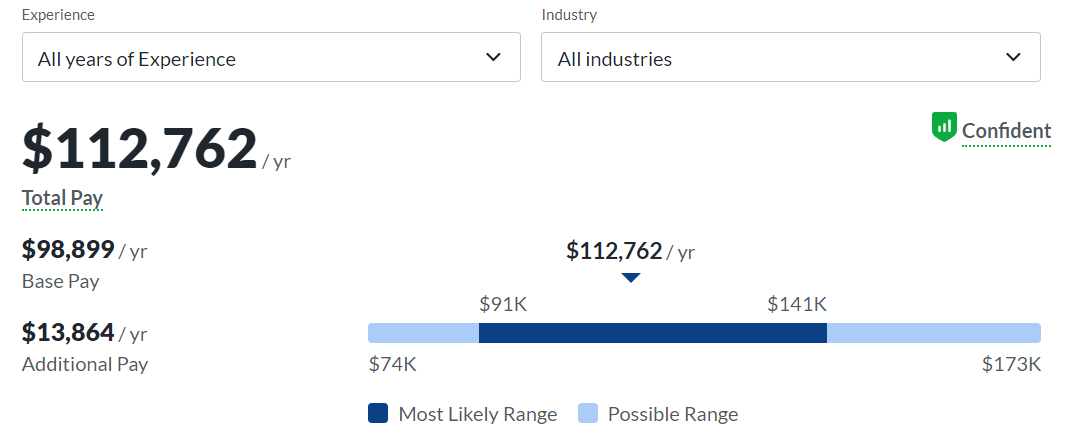Systems analysts work in a range of industries, from government agencies to healthcare and tech. This versatility leads to high demand and high salaries, but it’s also a cause of the most common problem for aspiring analysts—understanding exactly what they do. Not only is the job title pretty vague, but companies also use it to cover a range of different roles and responsibilities.
That makes it difficult to develop an idea about what a career in systems analysis would be like, and even more difficult to pinpoint the specific skills you need to start learning. In this article, we aim to demystify this issue and make it clear what a systems analyst does, what their goals are, and what skills they need to do their job.
What Does a Systems Analyst Do?
Systems analysts act as a liaison between business stakeholders and technical teams. Their main role is to analyze the organization’s complex computer systems, processes, and individual requirements so they can design, develop, and implement bespoke technology solutions. With the company’s overall business goals in mind, analysts aim to design technology-driven solutions to operational and organizational problems and inefficiencies, helping teams to achieve more with their resources.
For example, one of the key tasks of a systems analyst involves conducting in-depth assessments of existing systems and processes to identify inefficiencies and areas for improvement. This requires a solid foundation in programming languages, database management, and system architecture.
Systems Analyst Roles and Responsibilities by Career Stage
As with any other career, the role of systems analyst develops and changes as you work your way up the ranks and gain experience. Here’s what the different types of systems analysts do.
Starting Out
Junior systems analysts work under the guidance and supervision of senior analysts, team leads, and managers. Your primary role is to assist in analyzing business requirements and support the implementation while learning more about the role and developing your professional skills.
Responsibilities
- Requirements gathering
- System testing
- User support
- Documentation
- Collaboration
Mid-Level
As you progress into a mid-level position, you will have a more independent role and typically lead small to medium-sized projects. You will analyze business processes, design solutions, and start collaborating directly with stakeholders to develop your plans and get them signed off.
Responsibilities
- Requirements analysis
- System design
- Project coordination
- Stakeholder management
- Quality assurance
Senior-Level
When you reach the senior level, you will be in a leadership position and be responsible for complex projects and strategic initiatives. In addition to analyzing requirements and designing systems, you will also provide guidance, mentorship, and expertise to other team members. You’ll also be a part of the driving force behind the company’s technical direction and system analysis practices.
Responsibilities
- Strategic planning
- Solution architecture
- Team leadership
- Risk assessment and mitigation
- Process improvement
Systems Analyst Job Description
Here’s what a typical listing for a systems analyst role might look like.
Job Summary
The systems analyst is responsible for analyzing an organization’s systems and designing effective computer-based solutions to fit their business needs. Acting as a bridge between stakeholders and technical teams, you’ll ensure that hardware systems are aligned with the organization’s objectives.
Responsibilities
- Conduct interviews, workshops, and document analysis to assess business requirements for system development projects
- Create conceptual and technical systems designs like data models, interface designs, and workflow diagrams
- Analyze existing company processes to pinpoint areas for improvement and automation
- Perform feasibility studies to evaluate proposed system solutions
- Collaborate with development teams to test systems
- Provide training to end users and ongoing technical support
- Create comprehensive documentation for all stages of the research, design, implementation, and maintenance stages of a project
- Liaise with business stakeholders, IT teams, and project managers to ensure clear communication of project objectives and deliverables
- Participate in system testing to ensure developed systems meet quality standards
- Stay up to date with industry trends and emerging technologies and contribute to process improvements
Job Requirements
- Strong technical, problem-solving, and analytical skills
- Solid understanding of software development methodologies and system design principles
- Excellent verbal communication skills to collaborate with stakeholders and translate technical concepts to non-technical users
- Relevant experience with system analysis tools, project management software applications, documentation tools, and knowledge of hardware
- Relevant certifications such as Certified Systems Analyst Professional are a plus
Becoming a Systems Analyst: General Prerequisites
These are the general prerequisites for a systems analyst role:
Foundational Knowledge
- Solid understanding of computer science principles, operating systems, and software development concepts
- Advanced knowledge of programming languages such as Python, SQL, JavaScript, VBA, Bash, and PowerShell
- Knowledge of business procedure, workflow analysis, and system design methodologies
- Familiarity with database management and data modeling
Education
- Bachelor’s degree in business administration, computer science, information systems, software engineering, business, or other relevant area. If you don’t have a degree, a software engineering bootcamp can bridge that educational gap.
- Certifications such as the CSAP (Certified Systems Analyst Professional), CBAP (Certified Business Analysis Professional), PMP (Project Management Professional), PMI-ACP (Agile Certified Practitioner), and Microsoft Certified: Azure Data Fundamentals. Certifications are especially useful if you’re planning to break into the field without a bachelor’s degree.
Skills
- Analytical and problem-solving skills
- Excellent interpersonal communication
- Soft skills such as time management, public speaking, etc
- Critical thinking skills and attention to detail
- Business acumen
Tools
You don’t need to know every tool in this list to meet technical skill requirements, but you should become familiar with at least one or two from each category.
- Systems analysis and design tools: Microsoft Visio, Enterprise Architect, Lucidchart, Balsamiq, UML
- Requirements gathering and management: JIRA, IBM Rational RequisitePro, Confluence, Microsoft Excel, Google Sheets
- Database and SQL: Oracle, MySQL, Microsoft SQL Server, ERwin Data Modeler, MySQL Workbench
- Programming and scripting: Python, PowerShell, HTML, CSS, JavaScript, Java, C#, C++
- Project management and collaboration: Microsoft Project, Trello, Slack, Microsoft Teams
- Data analysis and reporting: Microsoft Excel, SQL, Pandas, NumPy, Tableau, Power BI, QlikView
Experience
- Prior experience in a systems analysis role or internship
- Good level of experience with gathering requirements and designing innovative solutions
- Familiarity with the software development lifecycle
Other Requirements
- Troubleshooting skills
- Continuous learning mindset
- Flexibility and adaptability
Pursuing a Systems Analyst Career
Before you jump into a college course or online bootcamp, there’s a lot to consider about becoming a computer systems analyst.
Who Should Consider a Career as a Systems Analyst?
There are a range of natural skills or past experiences that can make you a good candidate for a career in systems analysis. Here are a few examples:
- Analytical thinking: you enjoy breaking down complex technical issues and identifying optimal solutions
- Technical proficiency: you know your way around a computer, have experience in a technical role, or work on technical projects as a hobby
- Innovative thinking: You’re able to approach a complex issue with a creative mindset and search for new solutions
- Teamwork: you’re a team player and able to collaborate with a wide range of people in different roles and with different priorities
- Detail-oriented: you believe in doing a thorough job, conducting detailed analysis, and producing comprehensive documentation
- Continuous learning: you’re enthusiastic about the tech industry and the development of new technologies and methodologies
Pros of a Systems Analyst Career
- Variety of challenges
- Problem-solving and innovation
- Collaboration and teamwork
- Professional development opportunities
- Good growth projection, according to the U.S. Bureau of Labor Statistics
Cons of a Systems Analyst Career
- Demanding deadlines, pressure, and high-stress situations
- Rapidly changing technology
- Balancing business and technical requirements
- Communication challenges
How Much Does a Systems Analyst Earn?

The average salary for a systems analyst in the United States is $112,762. With experience and employment at a competitive company, salaries can reach highs of $173,000.
What Does the Career Path of a Systems Analyst Look Like?
After completing your education, it’s common to move straight into an entry-level systems analyst position. Under the guidance of more experienced colleagues, you’ll learn on the job and develop your skills.
As your years of experience pile up, you’ll start receiving more responsibilities and projects to manage. You’ll develop a good level of domain knowledge that will help you as you progress closer to senior-level roles.
Earning the title of senior marks the end of the career path for some business systems analysts—if you enjoy the role as it is, and you aren’t interested in management, you can retain your senior role and continue to lead projects and initiatives while staying closely involved with them.
Otherwise, you can transition into a specialization or leadership role. This could result in a new title like IT project manager, IT consultant, or IT manager. If you continue to rise higher and higher, you might receive titles like “principal,” “director,” and “fellow,” and the systems analyst salaries will continue to rise too.
Get To Know Other Software Engineering Students
Oscar Herrera
Student In The Software Engineering Bootcamp at Springboard
Dave McConeghy
Software Engineering Career Track Student at Springboard
Jason McGinty
Full-stack Systems Engineer at Technicity
What About AI – Will It Impact System Analysts in the Future?
There are a range of tools currently in use and development, and tools that are likely to be developed in the future that might impact systems analysts. These include:
- Automated analysis tools: Microsoft Visio, IBM Rational Rose
- Intelligent assistants for automating requirements gathering, communication, or troubleshooting: IBM Watson
- Data analysis and predictive tools: IBM SPSS
- Intelligent system design and automation tools: Enterprise Architect, Bizagi
While these tools have the potential to streamline certain aspects of the systems analysis process, human judgment, and domain expertise will remain essential. It’s a good idea for systems analysts to stay up to date with the development of AI tools and learn how to utilize them during analysis.
Systems Analyst FAQs
There are lots of aspects to consider before becoming a systems analyst. Here are some of the most common questions aspiring analysts have.
Is Being a Systems Analyst a Good Career?
Systems analyst can be a great career goal for individuals with an interest in technology, business needs, and problem-solving. There is stable demand for the position and a lot of opportunities for growth and professional development. It’s also a well-compensated role, with typical salaries reaching six figures.
Are Systems Analysts in High Demand?
The demand for systems analysts is considerable because they are useful to so many different industries. They can work in finance, healthcare, government, retail, consulting, tech, and more.
Do Systems Analysts Code?
While the amount of coding differs depending on the company, role, or project, most systems analysts are proficient in a couple of programming languages. The most common are scripting languages such as Python or PowerShell, and SQL for dealing with databases.
Can You Become a Systems Analyst Without a Degree?
Bachelor’s degrees can be advantageous, but they aren’t a strict requirement for systems analyst roles. You can also participate in online courses and bootcamps and take exams for professional certifications to help bolster your qualifications. Ultimately, if you can demonstrate the skills and experience required to do the job, you can still land a role without a degree.
Since you’re here…
Interested in a career in software engineering? Join our mentor-led Software Engineering Bootcamp or our foundational Software Engineering Course if you’re just starting out. We help people make the switch every day (just peep our reviews). You can do it, too!






